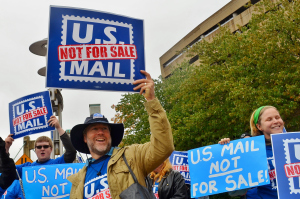

Share
Postal Service employees are bringing their unions together to push back against President Trump’s plans to privatize the federal agency.
And their solidarity is paying off.
Letter carriers, postal workers, mail handlers and other USPS employees in Minneapolis — and in communities across the country — rallied today with supporters, putting Trump and federal lawmakers on notice that the U.S. mail should not be for sale.
“As long as we can fight, we’re going to keep fighting to keep our Postal Service going strong,” said Harold Harvey, a member of St. Paul-based Branch 28 of the National Association of Letter Carriers, as he walked an informational picket line outside Minneapolis’ downtown post office.
Todd Elkerton, president of the American Postal Workers Union’s St. Paul chapter, noted the Postal Service is the only federal agency mentioned in the Constitution. “We believe the threat is real,” Elkerton said. “This will be the first time in U.S. history the president has come forward with a proposal to privatize the Postal Service.”
Several signs suggest Trump’s privatization push already is losing steam.
The president can’t sell off the Postal Service without the approval from Congress, and in just three months since Trump pledged action on the issue, a majority of House members and 42 senators have signed onto resolutions in support of keeping the agency under federal control. Minnesota Sen. Tina Smith and all five DFL House members are among the resolutions’ co-sponsors.
It may be no coincidence, then, that the recommendations of Trump’s hand-picked task force on postal reform, delivered to the White House in August, have not yet been released to the public.
Workers who rallied in downtown Minneapolis today said they fear privatization would drastically reduce mail service — especially in rural areas of the country — and cost many of the agency’s 500,000-plus employees their jobs. They pointed out the USPS is the nation’s second-largest employer of military veterans, and union jobs at the post office offer family-sustaining job opportunities to people of all educational backgrounds, races and ethnicities.
Sara Huebner was earning $12 an hour as a vet tech when she applied for a job delivering mail in St. Paul nearly six years ago. The college graduate said she gave up working in her field — “It was a livable wage versus a non-livable wage,” she said — but now worries privatization could send her back to square one.
Fellow St. Paul letter carrier Matt Falbo agreed. He pointed to Amazon as the employment model potential buyers might look to copy with the USPS.
Work at the post office “is good, honest work, and it could all go away if it’s privatized,” Falbo said. “They’ll cut our benefits. They’ll cut our pay. Everything we’ve fought for all these years will start going away.”

Trump and other supporters of privatization claim the Postal Service is broke and a drain on the federal budget, but neither claim passes the truth test. The agency is a self-sustaining, independent establishment of the federal government that does not receive taxpayer funding and relies solely on revenue derived from the sale of postal services and products.
Meanwhile, the Postal Service and its employees continue to enjoy overwhelming support from the Americans they serve. The most recent Pew Research Center poll, released in February 2018, showed that the USPS has an 88 percent favorability rating.
“The mail has been around for 200-plus years,” said Craig Barrett, who has delivered mail for 16 of those years. “It’s something everyone throughout the country relies on, and we’re here to fight for it.”

